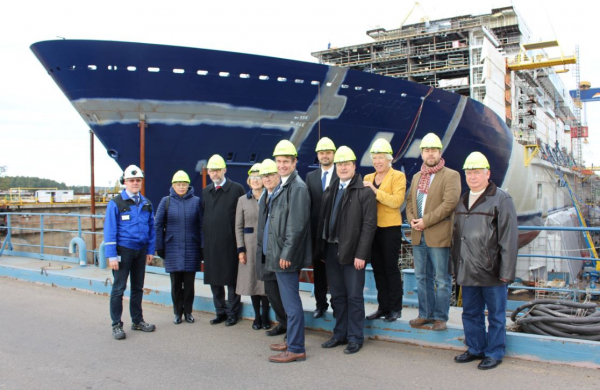ECR Group member Ilpo Haalisto unveils a new European transport connection during Group meeting in Turku

ECR Group members met in Turku, Finland to analyse the role of local and regional transport connections in delivering growth and jobs. Members met the Finnish Foreign Minister Timo Soini on the 19th and continued the debate over two panels on the 20th, where Members and experts discussed the current EU transport infrastructure policy and explored the role that innovation could play as well as how the public and private sectors could best work together. Mr Ilpo Haalisto (Local councillor of Nousiainen, Finland/ECR Group Bureau member) unveiled a proposal for a new Western-Finland high-speed transport route to be added to the existing trans-European transport (TEN-T) network. He underlined a new Turku-Oulu-Kirkenes highway connection would help complement the existing trans-European networks by helping increase connectivity, competitiveness and generate growth and jobs.
Mr Haalisto, unveiling his plans for a new link to the current trans-European transport network, explained that, "the existing transport networks in Europe misses out the Northern parts of the Nordic countries. We need to capitalise on the potential of the Nordic countries. Through a high-speed Turku (Finland) -Oulu (Finland) - Kirkenes (Norway) highway connection, which would build on the Stocholm (Sweden) -Turku connection, the European market can have access to the Arctic and through the Artic, to China. Currently, sending goods to China takes about a month. Through the Barents Sea in Arctic, this would take about two weeks. We can thus create a 'sea silk road'". Mr Haalisto also underlined that the next step could even be to create a new data cable from Europe to China along the "sea silk road".
Cllr Gordon Keymer CBE FCA (President of the ECR Group in the Committee of the Regions/Leader of Tandridge District Council, UK) underlined the importance of ensuring that the more remote areas of Europe remain connected. "Despite EU Treaty goals to build cohesion in all regions in the EU, we see that capital cities or the largest metropolitan centres are systematically prioritised. A genuinely holistic approach to balanced development is urgently needed and should form a fundamental pillar of the EU’s development policies. Transportation routes are an important way that that can be done. As the CoR rapporteur on "mobility in geographically and demographically challenged regions", I have called on the Commission to launch a debate on the mobility challenges faced by our remote areas through a White paper. I believe this remains a necessity" said Cllr Keymer.
Finnish Foreign Minister Timo Soini, discussing the importance of developing and modernising transport infrastructure with the ECR Group members, underlined the importance of local and regional authorities involvements. Addressing the ECR Group Members, the Foreign Minister said "you have a major role in implementation and have the best knowledge of how things are on the ground. Things must be done locally wherever and whenever possible. I’m very happy that the Committee of the Regions has been so active in these issues, be it on the TEN-T networks or the Connecting Europe Facility." Mr Soini also noted that "transport is much more than asphalt, railways, and bridges. Digitalisation and automation offer a huge variety of possibilities for the transport sector".
The ECR Group meeting in Turku, Finland brought together politicians and experts to identify challenges and solutions in the European transport sector so that greater interconnectivity can be achieved. Members took stock of the current transport connections and discussed the role that innovation and technology can play as well as how the public and private sectors could work together.
This meeting took place in light of the new EU transport infrastructure policy that has been in place since January 2014. The new Trans-European Transport Networks (TEN-T) aims to modernise and ‘knit together’ today’s patchwork of national parts into a smooth-running network that connects all corners of Europe while making the best use of all the different means of travel. It has a budget of €26 billion up to 2020 and in combination with funds from other EU sources and the EIB, it is expected to significantly stimulate investments and ensure a successful implementation of the new infrastructure policy. "The Juncker investment plan of €315 billion also presents an important opportunity to further improve our interconnectivity" said Mr Haalisto.

